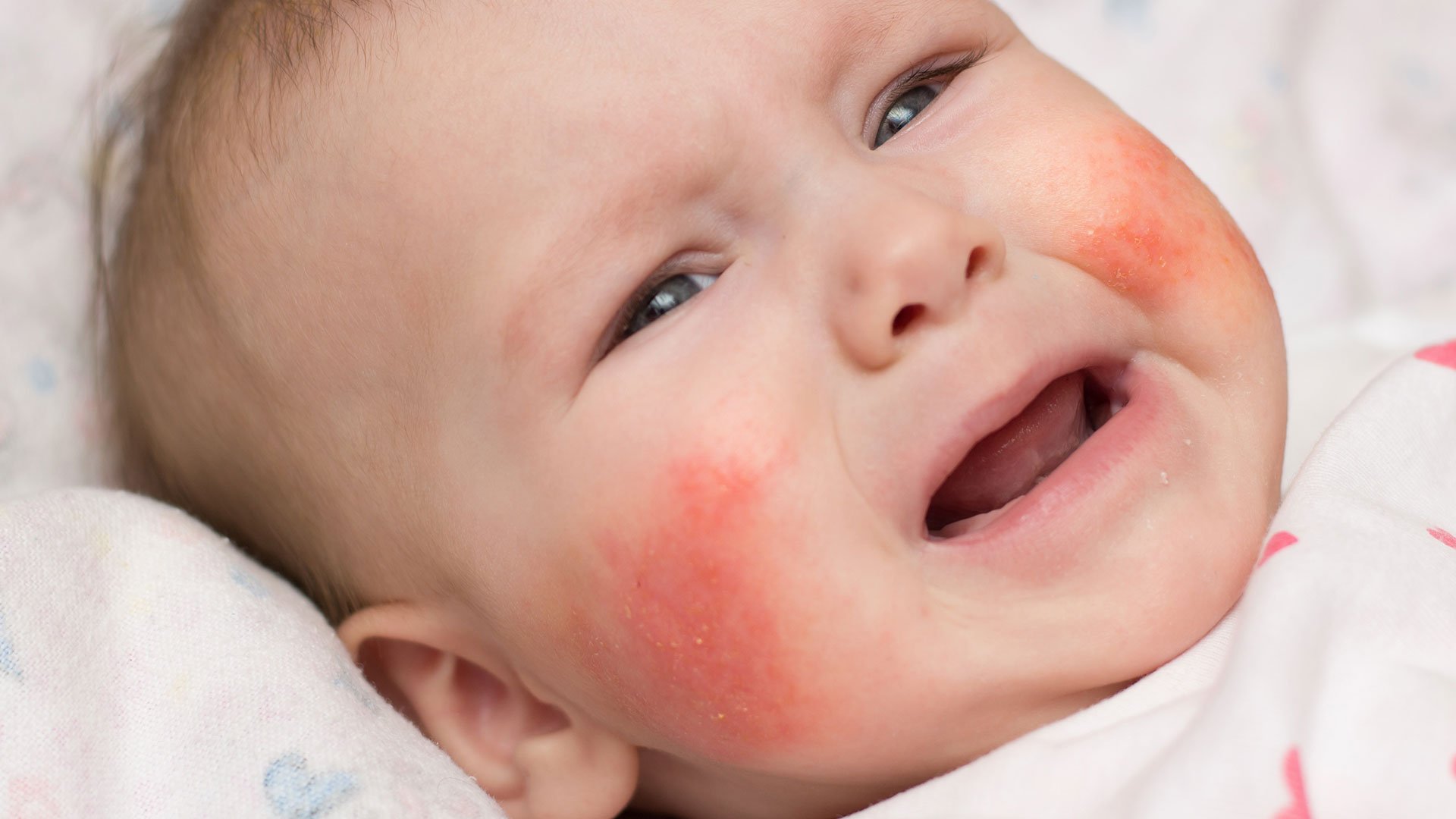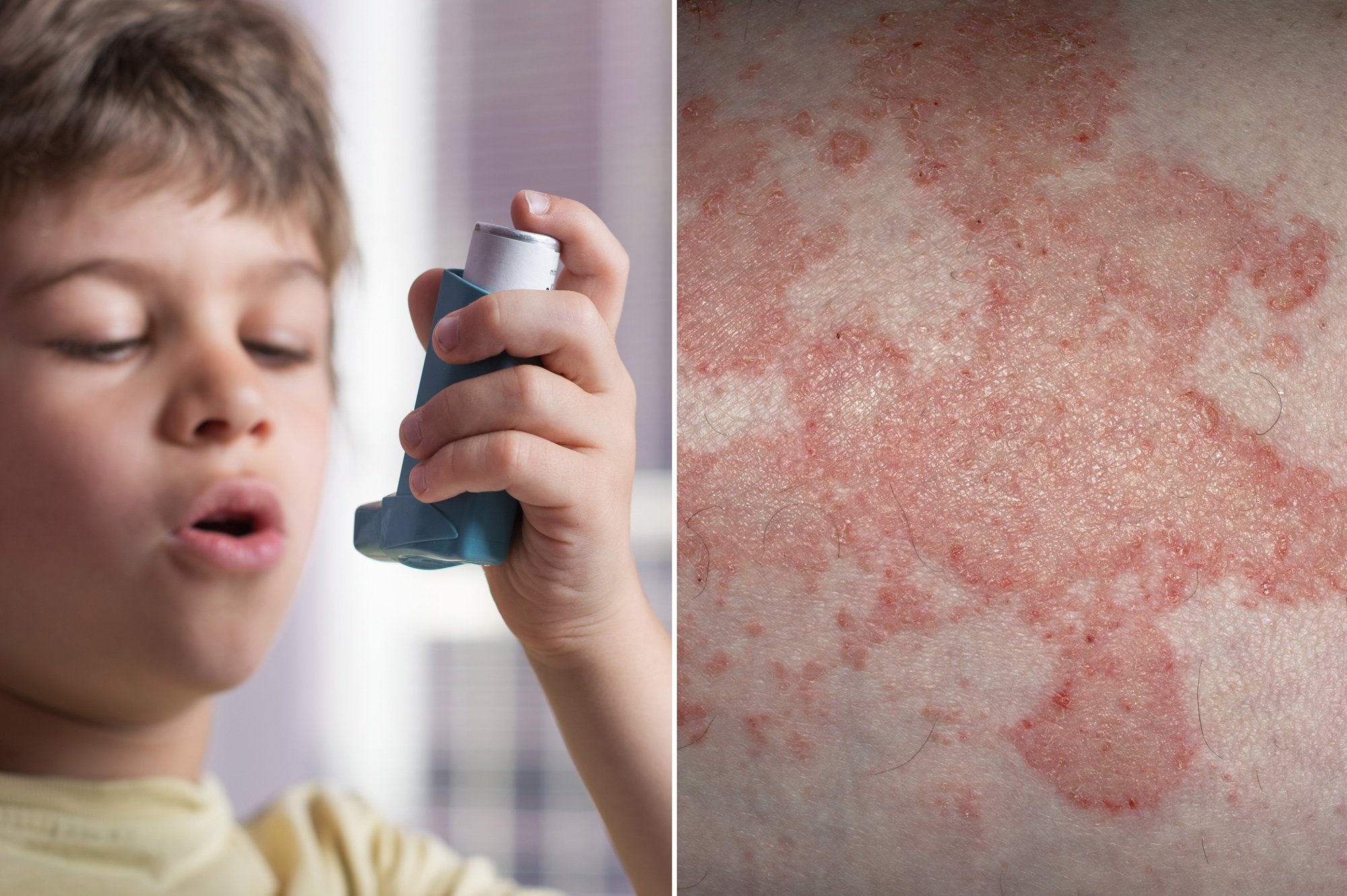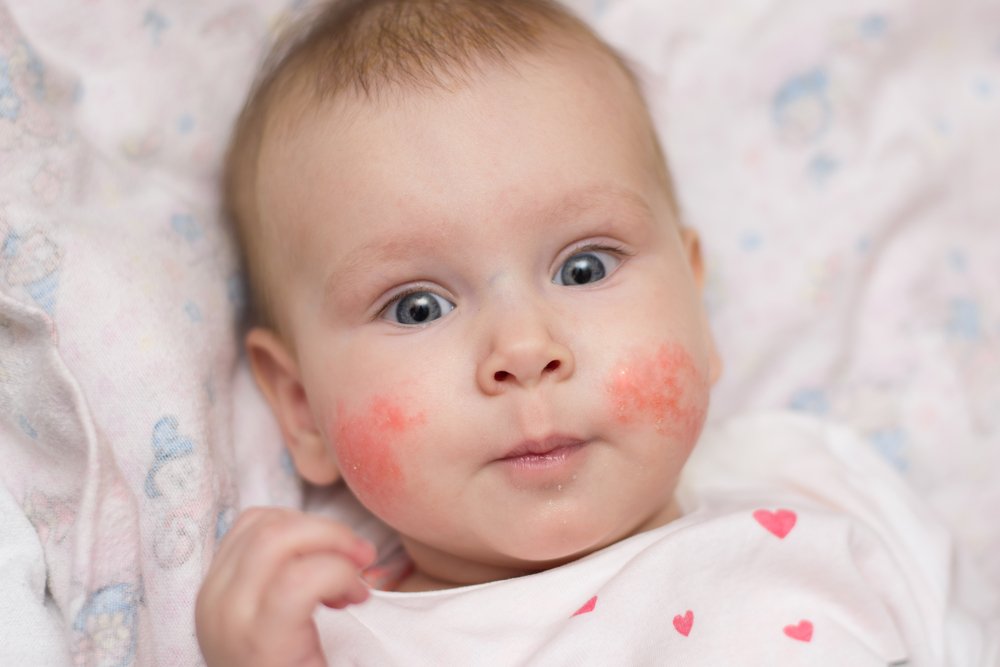What Causes Eczema In Infants And Children
Eczema is brought about by the complex interplay of a genetic predisposition and the childs environment. Many things from the climate to possible allergens can cause eczema to flare. We know that eczema tends to run in the families with a predisposition to other atopic diseases, such as food allergies, asthma and hay fever. Individuals with atopic dermatitis may lack certain proteins in the skin, which leads to greater sensitivity. Parents with eczema are more likely to have children with eczema. However, the exact way it passes from parents to children is still not known. Most children who have eczema will show signs of the condition in the first year of life. It tends to wax and wane in severity.
Causes Of Atopic Eczema
The exact cause of atopic eczema is unknown, but it’s clear it is not down to one single thing.
Atopic eczema often occurs in people who get allergies. “Atopic” means sensitivity to allergens.
It can run in families, and often develops alongside other conditions, such as asthma and hay fever.
The symptoms of atopic eczema often have certain triggers, such as soaps, detergents, stress and the weather.
Sometimes food allergies can play a part, especially in young children with severe eczema.
You may be asked to keep a food diary to try to determine whether a specific food makes your symptoms worse.
Allergy tests are not usually needed, although they’re sometimes helpful in identifying whether a food allergy may be triggering symptoms.
Help Your Child Avoid Personal Irritants
Some substances can irritate skin and start the cycle of itching and scratching. If you notice that your child’s eczema gets worse after being exposed to something, help your child avoid it. Irritants are not the same for all children. If a common trigger does not bother your child, there is no reason to avoid it. Here are some examples of possible triggers that can cause eczema flare-ups in some children.
Perfumes and fragrances, including the skin care and bathing products that contain them
Harsh soaps
Bath salts or bubble baths
Rough clothing, including wool fabrics
Temperature extremes, including hot and cold, dry air
Skin Infections
Children with eczema often have more bacteria on their skin. Even when it does not cause an infection, the bacteria can make the skin more irritated and can make the eczema worse, so keeping clean is important.
Babies and children with eczema are also prone to skin infections. Infections make the eczema even worse and need to be treated by a doctor. An oral antibiotic, antibiotic cream or very small amount of bleach added to bath water might be prescribed. Bleach should not be added to bath water without guidance from your child’s doctor. Signs of possible infection include: increased pain, tenderness or swelling, hot skin, fever, pus, or red streaks extending from the affected skin.
Stress
Environmental allergens
Foods that are not allergens
Recommended Reading: Neosporin Eczema Essentials Anti Itch Cream Cvs
Possible Explanations For The Relationship Between Eczema And Asthma And Rhinitis
Evidence from several experimental studies has suggested that impaired epithelial function results in increased sensitization and IgE production. In humans, the theory of epicutaneous sensitization is supported by the observation that exposing atopic children to topical emollients containing peanut protein leads to an increased risk of airway peanut sensitization. Genetic factors, such as the common loss of function mutations within the filaggrin gene, are a risk factor for incident eczema and account for skin barrier dysfunction. Recently, it has been shown that filaggrin mutations affect asthma, which supports the hypothesis that impaired skin function acts as a gateway for allergens, increasing the risk of atopic airways diseases.
Whats The Difference Between Dermatitis And Psoriasis

Psoriasis and dermatitis can appear similar. Both cause patches of red skin. However, in psoriasis, the scales are thick and the edges of those scales are well-defined.
Discuss with your healthcare provider your questions about which type of skin condition you have. You can have more than one skin condition at a time. Treatments for one may not work for the other.
Also Check: Does Alcohol Flare Up Eczema
Recommended Reading: Best Eczema Cream For Infants
What Caused My Babys Eczema
There is no single cause of atopic eczema. Eczema is a complex condition it is genetic but also involves an overactive immune response to environmental factors, which cause eczema flares. Because the atopic gene is hereditary, it runs in families, and is responsible for three conditions: eczema, asthma and hay fever.
Fifty per cent of people with eczema have an additional genetic element a difference in a skin protein called filaggrin which leads to further problems in the skin barrier. All atopic conditions can be linked to allergies in some people, but there are also many universal irritants, such as soap and heat.
A Potent Remedy For Childhood Eczema
As for the effect of the combined anti-inflammatory compounds on both conditions, this was also quite successful.
Cutaneous combined activation of reduced skin inflammation to a higher extent compared to single activation, write the authors.
The combined therapy effectively alleviated , but was insufficient at preventing allergic asthmatic response in the lungs, says Dr. Deckers.
This was done by counteracting the response of the so-called T helper 17 cells a type of immune cell.
However, the treatment did significantly reduce the severity of the asthma by counteracting one aspect of the specific immune response in the lungs. In this way, the therapy represents a potent remedy against allergic skin inflammation and the aggravation of atopic march.
Dr. Julie Deckers
In future, the scientists are looking to bring their findings to human clinical trials and simultaneously work on developing new therapies that could effectively stop the development of the atopic march.
Neither atopic dermatitis nor asthma have a known cure, so the need for prevention strategies for these conditions remains dire.
You May Like: Best Lotion For Eczema On Feet
Can Food Allergy Cause Eczema
Although food allergy is more common in children who have eczema, they are separate conditions.
Food allergy does not normally cause eczema, but having eczema may increase the chance that a food allergy develops. For a description of how eczema may increase the risk of food allergy, please refer to the section on the next page called: How can good eczema control help prevent food allergy?
How Is Eczema Triggered
Like asthma, eczema is often triggered by exposure to certain environmental triggers. These may include, but are not limited to:5,6
- Metals, such as those used to make necklaces
- Products such as latex gloves or rubber wastebands
- Flora on your skin
- Other substances found in clothing products, nail polish, etc.
- Humidity
- Drooling
Recommended Reading: Best Natural Face Moisturizer For Eczema
Seattle Children’s Urgent Care Locations
If your childâs illness or injury is life-threatening, call 911.
General Tips For Coping With Eczema
Other tips to manage your eczema include:
- Keep your fingernails short longer nails are more likely to injure your skin when you scratch.
- If the water in your area is hard or alkaline, consider installing a water-softening device.
- Swim in the sea in warm weather whenever you can seawater is known to reduce the symptoms of eczema.
- Use sun exposure for limited periods for example, when swimming at the beach. This can help relieve eczema symptoms. But be aware that ultraviolet radiation is a risk factor for skin cancer and premature ageing of the skin. Also, if sun exposure causes overheating, this can also aggravate eczema.
You May Like: How Do You Treat Dyshidrotic Eczema
Other Types Of Eczema
Eczema is the name for a group of skin conditions that cause dry, irritated skin.
Other types of eczema include:
- discoid eczema a type of eczema that occurs in circular or oval patches on the skin
- contact dermatitis a type of eczema that occurs when the body comes into contact with a particular substance
- varicose eczema a type of eczema that most often affects the lower legs and is caused by problems with the flow of blood through the leg veins
- seborrhoeic eczema a type of eczema where red, scaly patches develop on the sides of the nose, eyebrows, ears and scalp
- dyshidrotic eczema a type of eczema that causes tiny blisters to erupt across the palms of the hands
Page last reviewed: 05 December 2019 Next review due: 05 December 2022
Icipation And Summary Of Symptoms

At the follow-up at 4.5 years of age, 115 out of 123 children participated and several of them displayed more than one symptom. Of the 115, 60 still suffered from eczema, 26 had ARC, 37 had asthma and 35 had no symptoms of atopic disease at all. Ninety-four out of 123 completed the entire study until 10 years of age, of whom 60 continued to have eczema, 44 had ARC, 27 had asthma and 13 had no symptoms of allergy at all.
Recommended Reading: Is Eczema A Medical Condition
What Are The Signs & Symptoms Of Eczema
The signs of eczema :
- are mainly dry, itchy skin. Because it is so itchy, it is often called “the itch that rashes.”
- include redness, scales, and bumps that can leak fluid and then crust over
- tend to come and go. When they get worse, it is called a flare-up.
- may be more noticeable at night
Symptoms can vary:
- Infants younger than 1 year old usually have the eczema rash on their cheeks, forehead, or scalp. It may spread to the knees, elbows, and trunk .
- Older kids and teens usually get the rash in the bends of the elbows, behind the knees, on the neck, or on the inner wrists and ankles. Their skin is often scalier and drier than when the eczema first began. It also can be thicker, darker, or scarred from all the scratching .
What Is Genital Itching
Itching in the genital region can result from irritation, allergy, inflammation, infection or cancer. Irritation can occur as a result of exposure to chemicals in soaps, feminine hygiene products, perfumes, lubricants, douches, and creams. Similar chemicals can also cause in some people, as can latex. In the case of irritation and allergy, avoiding exposure to the irritant or allergen may be all that is needed for the itching to resolve.
Sexually transmitted infections, such as herpes or trichomoniasis, can cause genital itching, as can other infections, such as yeast infections and bacterial vaginosis. Pubic lice, also called crabs, are sexually transmitted and typically cause genital itching. Scabies, which can be spread sexually or through other skin-to-skin contact, is a contagious skin disease that typically causes itching. Scabies is caused by very small mites and can affect any part of the body.
Tinea cruris, a sometimes referred to as jock itch or ringworm of the groin, can also cause genital infection. People who have cruris may also have athletes foot or .
Genital itching is unlikely to be part of a condition that requires emergent treatment however, it can have several causes, some of which are easily treated and others that can ultimately lead to serious complications. If you have genital itching that lasts for a couple days or more or causes you concern, seek prompt medical care.
You May Like: What Cream Can I Use For Eczema On My Face
Don’t Miss: How To Clear Up Eczema On Baby’s Face
Who Should Be Tested
With up to 70 percent of infants and young children with eczema having an underlying allergy that contributes to disease severity,â¯healthcare providers can use specific IgE testing to enhance the diagnostic process and pinpoint those allergensâ¯thatâ¯may be triggeringâ¯eczema symptoms.16,17 The specific information gleaned from test results can also be used to develop a personalized treatment plan.â¯â¯
What Does It Look Like
The signs of eczema in infants include itchy, dry and scaly skin, redness and swelling of the skin and small bumps that open and weep when scratched. In infants and young children, eczema is usually found on the face, outside of the elbows, and on the knees.
In older children and adults, eczema tends to be on the hands and feet, the arms, and on the back of the knees.Keep in mind that all patches of dry skin are not eczema. The cold, dry outdoor air and indoor heating can dry all babies skin in winter, causing dry patches. In children prone to dry skin, so can the sun, air conditioning, and pool and salt water.
We dermatologists usually say if its not itchy, its not eczema you cant make a diagnosis of eczema unless there is an itchiness that goes with the rash. Babies with cradle cap, also known as seborrheic dermatitis, can also have a wide-spread rash, which is not eczema in itself. But it is common for cradle cap and eczema to co-exist in the first several months of life.
You May Like: Why Is My Eczema So Bad In Summer
You May Like: Is There Any Treatment For Eczema
Odds Of Developing Asthma And Rhinitis
Unadjusted analyses showed that children with eczema at baseline had more than a 2-fold increase in the odds of developing asthma and a 3-fold increase in the odds of developing rhinitis compared with children without eczema at baseline. The odds for developing asthma and rhinitis remained increased after adjustment for eczema, sex, age, family history of allergic disease, asthma, length of breastfeeding, PVC-flooring material in the home, type of building, environmental tobacco smoke, and number of adults living with the child .
Table 2 Factors associated with the 5-year cumulative incidence of asthma and incidence of rhinitis in eczema patients aged 12years in Sweden
What Are The Differences Between The Skin Symptoms Of Food Allergy And Eczema
An allergic reaction to a food typically happens quickly. Symptoms of an allergic reaction then go away, usually after several hours, as long as the food is not eaten again. Eczema is a chronic condition that does not go away quickly. Eczema tends to show up in predictable places, such as on the cheeks of young babies or elbow creases of older children. The places on the skin where symptoms of an allergic reaction to food appear are more unpredictable. Hives, redness and itching from an allergic reaction can show up just about anywhere on the body and even in different places each time the food is eaten.
You May Like: 6 Month Old Eczema On Face
Associations Of Atopic Dermatitis And Asthma With Child Behaviour: Results From The Probit Cohort
Institute of Environmental Medicine, Karolinska Institutet, Stockholm, Sweden
Sachs Children and Youth Hospital, Södersjukhuset, Stockholm, Sweden
St Johns Institute of Dermatology, Kings College London, London, UK
Correspondence
Emily Oken
Division of Chronic Disease Research Across the Lifecourse, Department of Population Medicine, Harvard Medical School and Harvard Pilgrim Health Care Institute, Boston, Massachusetts
Mourad Dahhou
Departments of Pediatrics and of Epidemiology, Biostatistics and Occupational Health, Faculty of Medicine, McGill University, Montreal, Quebec, Canada
Jennifer Thompson
Division of Chronic Disease Research Across the Lifecourse, Department of Population Medicine, Harvard Medical School and Harvard Pilgrim Health Care Institute, Boston, Massachusetts
Seungmi Yang
Departments of Pediatrics and of Epidemiology, Biostatistics and Occupational Health, Faculty of Medicine, McGill University, Montreal, Quebec, Canada
Richard M. Martin
Department of Population Health Sciences, Bristol Medical School, University of Bristol, Bristol, UK
University Hospitals Bristol NHS Foundation Trust, National Institute for Health Research, Bristol Biomedical Research Centre, University of Bristol, Bristol, UK
Medical Research Council Integrative Epidemiology Unit, University of Bristol, Bristol, UK
Carsten Flohr
St John’s Institute of Dermatology, Guy’s and St Thomas’ Hospital, NHS Foundation Trust and King’s College London, London, UK
Correspondence
Which Is The Best Emollient For My Baby

Emollients treat dry skin by providing a surface film of oils. This increases water in the upper layer of the skin, restoring and providing a robust skin barrier, to prevent the entry of environmental agents or triggers.
Emollients soften the skin and reduce itch. If they are used regularly to maintain skin hydration, they can reduce the frequency of eczema flares. Leave-on emollients include lotions, creams,ointments and gels.
The emollient advised or prescribed for your baby should prevent dry skin and not cause irritation. You might need to try several products until you find the right one. Apply leave-on emollients regularly, throughout the day for example, at every nappy change and after bathing.
Use the product liberally . To apply the product, dot it all over the skin, and then smooth it in, using a gentle, downward, stroking motion rather than rubbing in.
Don’t Miss: Baltic Amber Necklace For Eczema